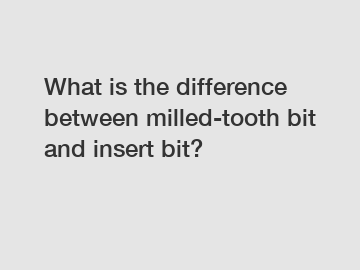What is the difference between milled-tooth bit and insert bit?
In the vast world of drilling equipment, two key types of drill bits stand out: milled-tooth bits and insert bits. Whether you're an industry professional or simply curious about the intricacies of drilling, understanding the differences between these two techniques is crucial. Today, we delve into the distinct features and applications of milled-tooth and insert bits, offering insights that will help you make an informed choice for any drilling project.
1. Milled-Tooth Bits:
Milled-tooth bits, also known as roller cone bits, are characterized by their robust construction and versatility. These bits are crafted with tungsten carbide or hardened steel teeth that are individually milled into the cones. The teeth vary in shape, projection, and hardness depending on the specific drilling conditions.

Robust design: Milled-tooth bits employ a rugged design, making them suitable for drilling through various formations, including soft, medium, and hard rock formations. The cone-shaped structures on these drill bits provide stability and structural integrity during the drilling process.
Superior adaptability: Milled-tooth bits can be customized to specific drilling environments based on tooth types, including milled-tooth, chisel-tooth, or conical teeth. The adaptability allows fine-tuning, resulting in efficient penetration rates and enhanced overall performance.
Widely applicable: These drill bits find application across diverse industries, such as oil and gas, mining, geothermal drilling, and water well drilling. Their versatility makes them a favorite choice for exploratory drilling as they can handle a wide range of formations.
2. Insert Bits:
Insert bits, also referred to as fixed-cutter or non-roller cone bits, are crafted from a solid piece of tungsten carbide material. These bits feature strategically placed polycrystalline diamond compact (PDC) cutters or natural diamonds as the cutting elements.
Cutting efficiency: PDC cutters on insert bits offer exceptional cutting efficiency due to their high diamond content and durable composition. The diamond cutters shear rock formations, resulting in reduced torque, improved ROP (Rate of Penetration), and enhanced drilling performance.
Specific drilling conditions: Insert bits are primarily used for drilling through softer formations, including clay, shale, sandstone, and limestone. They are specifically engineered for applications where roller cone bits may struggle to deliver optimal results.
Minimal maintenance: Compared to milled-tooth bits, insert bits require less maintenance due to their fixed cutter design. The absence of moving parts ensures minimal wear and tear, resulting in increased durability.
Choosing the Right Bit:
When determining which bit to utilize for a drilling project, several factors come into play:
Formation analysis: Carefully analyze the rock formation characteristics to determine its hardness, abrasiveness, and any unpredictable conditions that may affect drilling performance. Select a bit that matches the formation's properties.
Drilling objectives: Define your drilling objectives and evaluate whether you require a higher penetration rate or precision in a specific formation. This will guide you in selecting the most suitable bit type.
Budget considerations: Factor in your budgetary constraints. While insert bits may have a higher initial investment, they often offer a competitive advantage in terms of reduced operational costs and increased drilling efficiency.
Conclusion:
In the dynamic world of drilling, understanding the differences between milled-tooth bits and insert bits is crucial to ensure efficient and successful drilling projects. Milled-tooth bits are versatile and adaptable, while insert bits excel in specific formations with their exceptional cutting efficiency. By considering the formation characteristics, drilling objectives, and budget constraints, you can confidently choose the right bit for your drilling needs. Remember, the expertise of a skilled drilling professional or consultation with a reputable drilling equipment supplier can further refine your decision-making process.
For more information, please visit Tricone Drill Bit Manufacturer, Matrix Body PDC Drill Bit, Water Well Drilling Steel Body PDC Bits.


